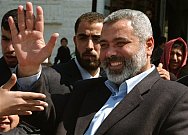Hamas won’t cave into submission by sanctions
The new Hamas government is ready to talk to international mediators about solving the Mideast conflict, but won't cave in to economic pressures to soften its hardline agenda, the incoming Hamas prime minister told parliament Monday. The prime minister-designate, Ismail Haniyeh, did not explain how he plans to resolve the disagreements with the international community, which insists Hamas recognize Israel, renounce violence and stick to existing Israeli-Palestinian agreements. Hamas has refused to meet the demands.

However, the new Hamas parliament speaker indicated the militant Islamic group might recognize Israel if it withdraws from all of the West Bank, a step forward for Hamas. Haniyeh's speech came at the start of a parliament debate, to be capped later this week by a vote of approval of his new government. The Islamic militants control the legislature, and approval of his Cabinet lineup is assured.
Palestinian leader Mahmoud Abbas, a moderate from the rival Fatah Party, was expected to swear in the ministers Thursday, two days after Israel's election. The new Palestinian government is expected to face increasing international isolation because of its hardline views. Haniyeh said Monday he is ready to work with the EU and the so-called Quartet of mediators the U.S., the U.N., the EU and Russia.
"The government ... is ready for dialogue with the Quartet," Haniyeh said. "The European Union has provided a lot of aid to our people, and supported our right for freedom. ... We are interested in a strong relation with Europe." His comments marked the first time Haniyeh suggested Hamas was interested in some form of negotiations, even indirectly, to settle the Israeli-Palestinian conflict. However, he also said the Palestinians have the right to resist Israeli occupation by force, and he largely referred to Israel in his speech as the "state of occupation."
However, he did not use the term "resistance" in his speech, referring to armed action against Israel, one of the main facets of Hamas ideology. Instead, he referred to the "right of self-defense." Raanan Gissin, an Israeli government spokesman, said Hamas has shown no sign of softening its positions. Haniyeh's speech "is an effort to sweet talk us into accepting a terrorist entity on our border, and really a government which is a non-starter government."
In an interview with Canadian Broadcasting Corp., parliament speaker Abdel Aziz Duaik suggested Hamas would recognize Israel if it withdraws from all of the West Bank and east Jerusalem. In that case, he told CBC-TV, he would want the government to "go to the people and ask them their opinion in a referendum," implying that Hamas would accept the results if the people approved.
Up to now, Hamas has offered Israel only a long-term cease-fire if it pulls out of all of the West Bank and east Jerusalem, though no Israeli government has offered such a withdrawal. Haniyeh said he also expected the EU to review some of its policies in the region, and exert more pressure on Israel. Hamas is listed as a terror group by the United States and European Union.
Marc Otte, a special EU envoy to the region, said Europe is waiting for Hamas to change. "If this government has a political program that we can work with, we will work with it. If it does not, we will not," Otte told The Associated Press, speaking on the sidelines of the Arab Summit in Khartoum, Sudan.
Western countries have threatened to cut off aid to the cash-strapped Palestinian Authority once the Hamas Cabinet is sworn in. The Palestinian Authority is heavily dependent on the tax transfers and foreign aid. Without a large infusion of money, the government could plunge into a devastating financial crisis. Haniyeh appealed to Arab businessmen to invest in the Palestinian areas to ease the financial hardships there.
"We are looking for their participation in easing our people's suffering, and easing the hardships and finding jobs for youths and graduates," he said. Haniyeh criticized the U.S. decision to cut off aid. "The U.S. administration, which calls for democracy, is invited to support the Palestinian choice, rather than imposing a siege," he said.
Israel's military chief of staff, Lt. Gen. Dan Halutz, said Monday that even words of reconciliation from Hamas if not followed by actions need to viewed warily.
"As long as there are not facts, they are just words that float in the air. We need to take this with a grain of salt," he said, according to Israeli media. "It may be that Hamas will pass a decision to recognize the state of Israel and agreements calling for the end of terror, but everything should be viewed carefully." Also Monday, the captured head of the Popular Front for the Liberation of Palestine, Ahmed Saadat, appeared in a military court outside Jerusalem. Saadat and five other prisoners were taken by Israeli forces after a daylong siege of the prison in Jericho earlier this month. Saadat and four others are accused of involvement in the 2001 assassination of Israeli Cabinet minister Revaham Zeevi. In the closed session, the court refused bail to Saadat, who managed to shout, to reporters, "I am fighting the occupation!" before he was whisked into the courtroom, reports the AP.
N.U.
Subscribe to Pravda.Ru Telegram channel, Facebook, RSS!




